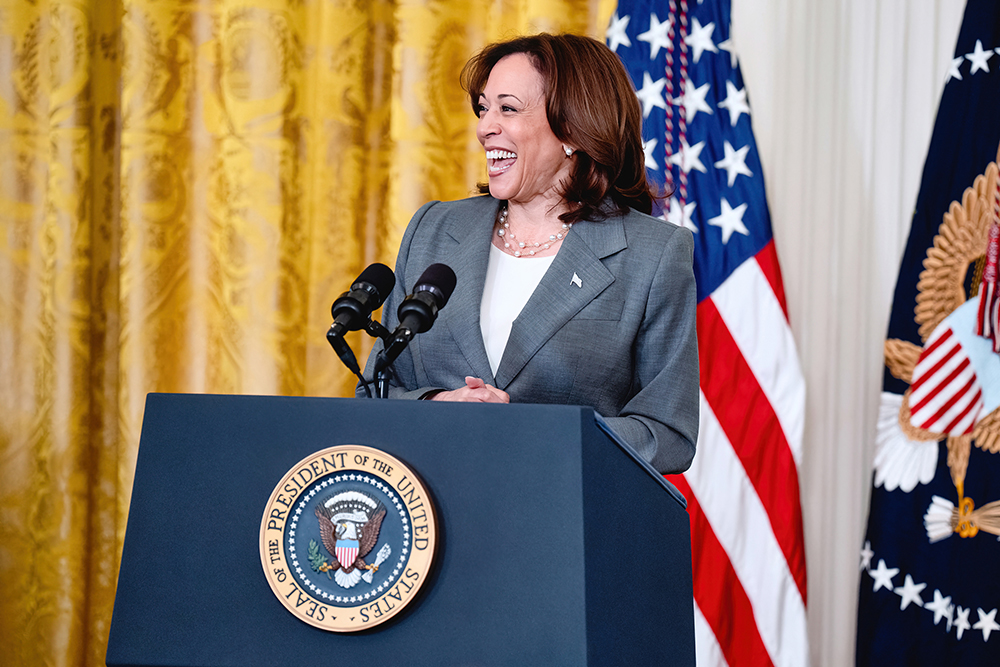Vice President Kamala Harris’ dramatic entry into the presidential race in July — including selecting Minnesota Governor Tim Walz as her running mate — put a new twist on the already gendered nature of the election. A woman was now at the top of the ticket.
Instead of Donald Trump’s and JD Vance’s misogynist manhood solely driving the media narrative, there was now a new storyline: Not only was a Black, South Asian woman the nominee; there also was a counternarrative — the egalitarian expression of manhood embodied by Walz and Doug Emhoff.
From the GOP convention theme song, “It’s a Man’s World,” to Hulk Hogan’s ridiculous tribute to old-school manhood, the Trump campaign gambled that their brand of “tough” masculinity would be a winning strategy against President Biden’s perceived “weak” portrayal of manhood. But Trump was caught up short when — just three days after his convention ended — he was facing a woman.
Into this fraught political moment comes a thought-provoking film exploring presidential masculinity. The Man Card: 50 Years of Gender, Power & the American Presidency is rich with content and context for voters to make sense of the gender politics playing out in the election. Created by educator-author Jackson Katz, The Man Card was originally released in 2020. The updated and expanded 2024 version crackles with urgency now that Kamala Harris is Trump’s opponent.
The Man Card demonstrates how presidents and the presidency have historically been linked in the American imagination with traditional ideas about men. The film exposes how the right uses one-dimensional ideas about manhood to portray Democrats as too weak to attract working-class white men. In less politically volatile times, a full-on review of the film would make sense. But writing about The Man Card weeks before the election invites viewers to assess the film through an activist, not an educational, lens. Viewers might ask themselves: What can I do to get the film into a local union hall, before groups of younger, working-class men, broadcast on community access television, streamed in battleground states?
The Young Men Research Initiative, which Katz cofounded earlier this year, is urging the media to cover the male side of the gender gap and the Democrats to reach out to young men, especially those who typically get their news from the online, misogynist manosphere rather than traditional media.
The film uses vivid archival and contemporary footage to illustrate the ways presidential masculinity is portrayed, ranging from a cowboy hat-wearing Ronald Reagan cutting brush on his Santa Barbara ranch to George W. Bush decked out in a fighter pilot’s uniform landing on the USS Abraham Lincoln to (wrongly) declare, “Mission accomplished,” in Iraq.
For the second time in eight years, a man whose political identity is rooted in both misogyny and reductive ideas about manhood is running against a woman. Instead of a white woman, now his opponent is Black and South Asian. Plus, she’s a prosecutor; he’s a felon. The Man Card asks white male voters, especially in battleground states, how they will judge the Harris-Walz ticket. Will they throw their support behind the MAGA movement that promises to restore men’s former glory? Or will they reject long-established voting patterns and help usher in a new era, redefining the highest office in the country, and with it our national identity?
Voters have a stark choice. Trump and Vance promote a rigid masculinity infused with both misogyny and Christian nationalism. They have used bigotry and fear of the other — including bald-faced lies about Haitian immigrants — to gin up their base. Meanwhile, Harris and Walz represent an evolving expression of leadership — championing women as leaders at the highest level — more suited to the 21st century.
Until now, the loudest voices in the struggle over which version of gender and power will prevail have been those promoting traditional masculinity as the key to solving society’s problems. Among them are some on the far right who, alarmingly, believe violence is both acceptable and necessary. Meanwhile, other voices are beginning to be recognized: those of antisexist men who have worked to transform conventional masculinity over the same half-century covered in The Man Card. They’ve been redefining manhood, fatherhood, and brotherhood. Now, it’s time to add white male presidents.
To better understand the deeply gendered social, cultural, and political forces that Kamala Harris is up against, here’s an idea: Set aside an hour and a quarter and watch The Man Card. Then, take to heart Michelle Obama’s challenge and “do something.” Maybe, begin by sharing what you learned with men you know — especially young men.
Rob Okun, syndicated by PeaceVoice, is editor emeritus of Voice Male magazine, chronicling the antisexist men’s movement for more than 30 years and is editor of the anthology, Voice Male: The Untold Story of the Profeminist Men’s Movement.
